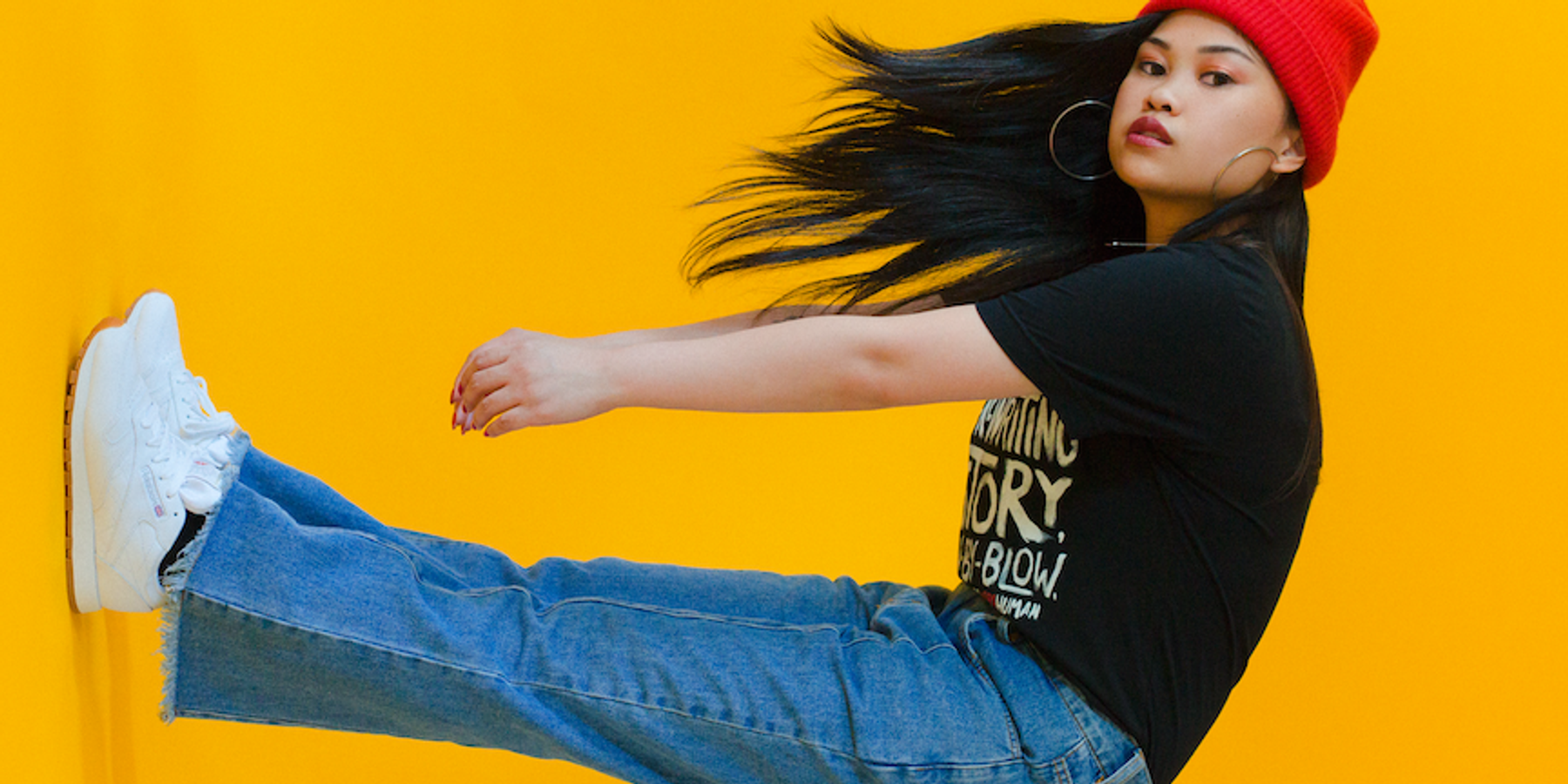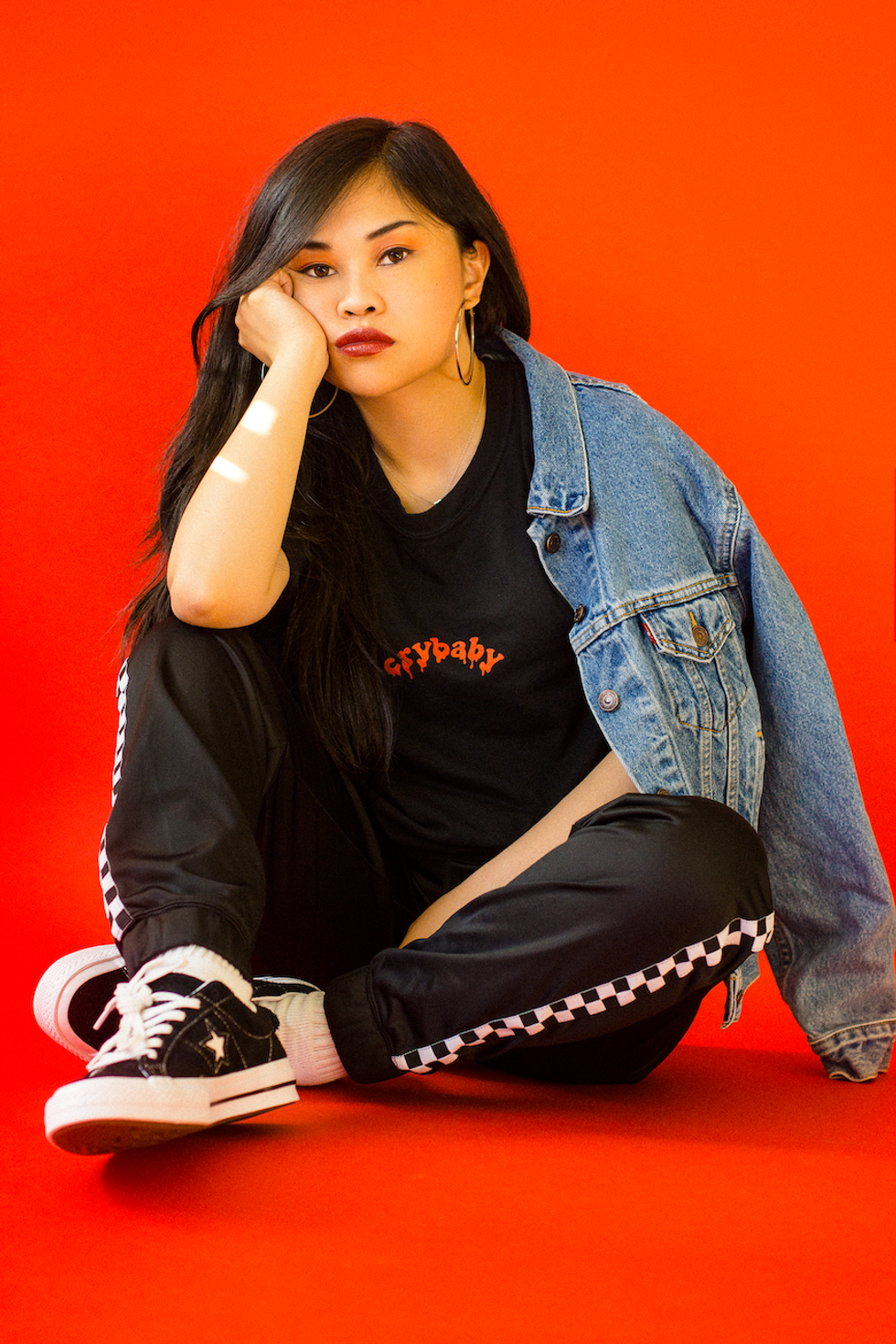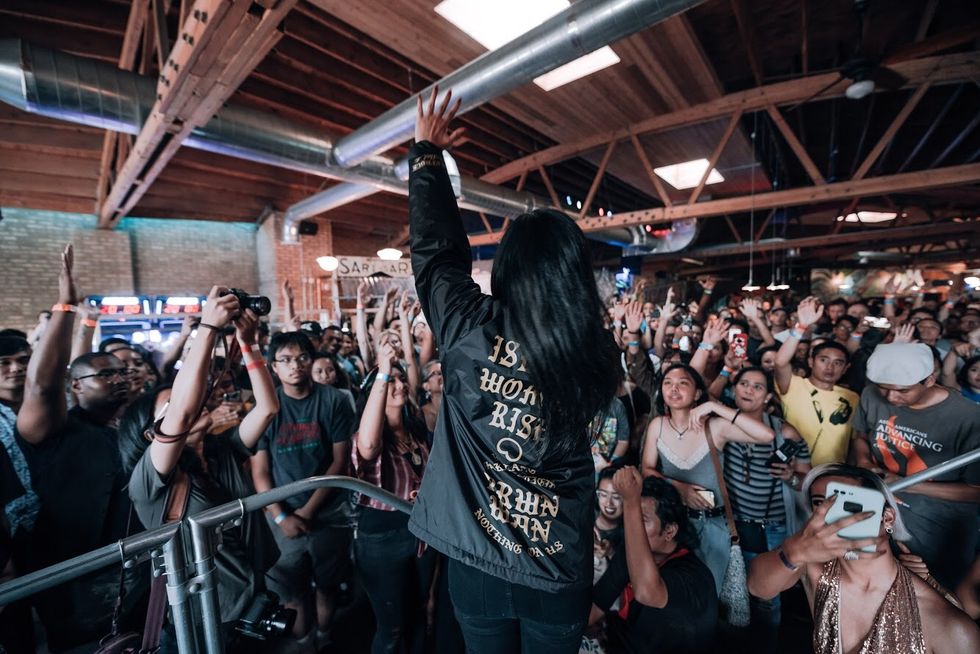
Over on the West Coast, Ruby Ibarra's been leading a movement. With her crisp and sharp verses that flow to killer rhythmic beats, the young Filipino emcee has given a voice to Pinays (slang for Filipino women/ Filipinas) not only in the Bay Area, but everywhere else in the world. Known for using Filipino cultural references, and Filipino languages such as Tagalog and Waray in her lyrics, Ibarra presents a unique sound — a whole other language — that accurately and succinctly represents the immigrant struggle. She speaks to Filipinos directly, and welcomes others to see things through her people's eyes. And though she hasn't just hit the mainstream music scene just yet, Ibarra has already managed to create a unifying anthem with her 2018 single, "Us," as she chants her mantra, "Island woman rise."
Ibarra was born in the Philippines, and lived the first few years of her childhood in Tacloban City. She and her parents moved to San Lorenzo, California, and since her teenage years has been consumed by hip-hop — crafting her own rhymes, and her own style. Eventually, she began to perform publicly in the Bay Area's underground hip-hop scene, in local circuits and cyphers. She soon released original music through Soundcloud and YouTube. And in 2017, she released her debut album Circa '91. Today, the rapper has amassed a following, counting among her admirers comedian Ali Wong, actor Harry Shum Jr., as well as local celebrities from the Philippines.
PAPER spoke with Ruby about her and her band's (The Balikbayans) recent trip to Manila, finding her voice in rap, and connecting to her roots through music and language.

What was it like being back in the Philippines?
It wasn't the first time that I was back for music. I would say this was probably the third trip that I've gone to the Philippines specifically to perform, but this was my first time to go with my new band that I just formed in the last six months. Being able to travel with [The Balikbayans], and knowing that we all have different Filipino-American identities, and seeing how the experience — not just as musicians — but I think on a personal level. I think that's what made the trip even more memorable for me. It was essentially a homecoming for each of us individually.
We performed at the Malasimbo festival, which is kind of similar in its approach to music as Coachella here in the States, where they invite a lot of bands from around the world. And to be able to be on a lineup that has names like Robert Glasper was just, to me, very mind-boggling. And I could say for sure that the people in my band were overly-excited. This is someone they look up to musically. So to be able to be on the same lineup as musicians that we highly respect, and to be in the Philippines at the same time is incredible. And what I've been wanting to do, too, since the release of Circa 91 in 2017 was to be able to bring the music back to Manila, specifically. I think that when I have a project that centers on an immigration story, it only makes sense to bring it back home.
You rap and sing, not just about the immigrant struggle. Your songs also, to some extent, talk about the struggle of Pinoys and Pinays in the homeland. How do you make sure to stay connected despite being so far away?
I grew up in a household where my family spoke in the native tongue. And they really made it a point for me and my sister to be able to understand, and for me specifically to speak the language, too. So, we had not only language but food and a lot of the traditional practices that my parents made sure that we learned since me and my sister were kids. Growing up with the Filipino culture here, I never really felt too far away from the Philippines. And growing up, too, in the Bay Area. When we talk about the Filipino diaspora, and just the immigration story across different Filipino identities whether it's Filipino-American, Filipino-Canadian — it's definitely very different. I think I'm also very fortunate that I'm Filipino-American who happened to grow up in the Bay Area where there's a very big Filipino-American community here. We're very close to Daly City in San Francisco where there's a big community. Growing up around a large community of Filipinos, I never really felt far from my identity.
"Growing up around a large community of Filipinos, I never really felt far from my identity."
What was the immigrant struggle like for you and your parents?
Although I was only four or five years old at that time, I think that I kind of had to grow up very fast. Having those two identities at a young age, and being thrown into a new community, a new culture, new surroundings — I think a lot of my fast growing up came from the fact that I saw how moving from one country to a whole other place kind of changed also the relationship between my parents. And I saw how being first-generation Filipino-American also affected my parents' not only identities, but also how they navigated through the US and how they also saw themselves.
In what way?
I remember seeing my mom, and she wanted to enter the workforce. Coming from the Philippines, she had an accounting degree, and after months and months of applying, the first job that she was able to get was as a janitor in McDonald's. I remember seeing my mom kinda feel like she had to swallow her pride in a lot of the moments, her first moments here. And seeing that as a kid — seeing someone like my mom who I saw as someone being my superhero, or someone who I thought was invincible, and seeing moments of vulnerability like that and seeing her break down at times really opened up my eyes. And I saw that there are these very complex layers of being an immigrant. And also realizing at an early age that when you talk about immigration, or even the American dream, it's not this fairytale that people make it out to be. Even just within the lens of the educational system, we see a lot of people who migrate from "third world countries" that come here to the US, and you see that their degrees don't translate equally here.
How did you decide that rap was the channel you'd use to express all of this? Was this something that you wanted to do since you were younger?
Absolutely! If I can recall, the very very first time I heard hip-hop enter my ears was when I was five years old. We had just moved to California. I think we were about three months in, and I was digging through one of the suitcases. We weren't fully unpacked yet. I was digging through one of my mom's suitcases, and one of them was just completely filled with cassette tapes. And I remember one of them had this emcee on the front. He was holding a boombox on the cover, and I popped in the tape, and it was this rapper named Francis Magalona from the Philippines. He's one of my influences for hip-hop. And I just remember the first track that played, and just being completely entranced in the music. My young five-year-old self just gravitated towards the rhythm that was coming out of his mouth. I remember at that very moment I instantly fell in love with hip-hop. Fas forward two weeks later, I was able to recite his song "Mga Kababayan" in verbatim as a five-year-old kid.
Again, I attribute a lot of my identity to the fact that I also grew up in the Bay Area. And growing up here in the Bay, hip-hop is definitely a big part of the community. You walk outside, you can hear Too Short or Tupac blasting out of someone's speakers out of their car. It's just heavily embedded in the lifestyle here. So, growing up, artists like Snoop, artists like Ice Cube were a big part of my childhood. And, eventually, I got introduced to artists like Lauryn Hill, and Wu-Tang, and that was my transition. Once I heard of those musicians, I thought I wanted to write my own music, and I was inspired enough to want to try and use music as my form of storytelling.

When did you decide this was something you wanted to turn into a career?
I would say, for the most part, music has always been something I was absolutely in love with but didn't see as a viable career option for me. As much as my parents were more on the liberal-thinking Filipino-American's side — they didn't really push me and my sister to do anything we didn't want to do — but they still very much heavily stressed the importance of education. So it's always in my mind to go to school, finish school, get a degree, and get a job. So I never really thought that music could be a career path for me, but I think it wasn't until I released Circa '91 when I sat down and I thought this could be a possible career path. There's actually an audience for me. I think, for most of my career, I kind of set it in the back-burner and was just putting out music because I felt like I needed to express myself. I felt like if I didn't write, if I didn't record, if I didn't perform, then I didn't have place where I: a) felt like I was in peace, but b) also feel like I also had a voice.
What were some obstacles you feel like you had to overcome in order to get where you are today?
I think a lot of those obstacles really just come from letting people knowing that I come from an authentic place. I think before that, a lot of the videos that I came out with as an artist — I was more focused on proving why I had to be on the mic, and kind of showing off the lyricism. I grew up listening to a lot of '90s hip-hop, so I felt like I wanted to introduce myself first, and I think I got people's attention but people didn't know my story. So, it wasn't until I came out with the last project where people knew who the person was behind the mic. And I think that's where a lot of the internal struggle for myself as an artist, you know, what kind of lane do I want to take. What kind of artist do I want to be? And, ultimately, I thought, "What's the purpose of having a platform if I'm not using it to say anything?" So I decided if I was going to write a full project that it had to be not only about myself, but also a chance to chronicle my parents' stories. Because oftentimes, we don't hear what a forty-year-old Filipina goes through, or an immigrant father that came from Manila went through. I thought it was very important to be able to amplify those voices, those stories we don't often hear.
I feel like for the most part I'm very fortunate to be an artist in a time where I kind of have resources. I pretty much have resources available to me to be able to put my music out there on my own without needing the middleman, or these bigger corporations. And, I think, that's one of the advantages of social media right now. We have platforms like YouTube, Facebook, Instagram, where the artists can really take matters into their own hands. And we're able to not only put out music in front of so many more ears, but we are also able to keep our integrity and keep continuing to make the music that we want to make, and doing things in our own terms.
"I thought, "What's the purpose of having a platform if I'm not using it to say anything?" So I decided if I was going to write a full project that it had to be not only about myself, but also a chance to chronicle my parents' stories."
I know you use Waray and Tagalog in your rap. What inspired you to choose to do that? How do you think it makes your music more powerful?
The first time I used Tagalog in my rap, I was part of a cypher. I think this was right after college. And it was just me wanting people to hear what our dialects sound like. And I felt like there weren't a lot of emcees that were doing that, so I was like, "Fuck it! I want to do this. I want people to hear our beautiful language." I remember doing that at a live performance, and people were like, "Oh! Wow!" This is something that surprised people, because again Tagalog, even Waray or Cebuano—those are all languages people don't often hear, especially when we put it in the scope of American music. So after that experience, as an emcee, I felt like, "Oh! It sounds dope within the sounds of hip-hop." So when it came to writing Circa '91, which was more very heavy in themes and subject matter, again the intent for that album was to create my immigrant story, reflect on what it meant for me to be a first-generation Filipino-American. And I knew for sure that I had to include those different [languages] in at least one of the songs on the album. Because I feel like when you talk about the immigrant story, there's no way that you can fully express it or tell it without using language as well. When we think about the different immigrant communities that we have here in the US, you can't walk into a Spanish community or a Filipino community and not hear one of their beautiful languages. I think language will, and always will be, an important part of identity, and also be an important part of what it means to be an immigrant community.
Your mantra is "island woman rise" or "brown woman rise." What does that mean to you?
To me, it means reclaiming your story. It means rewriting this narrative that we've been erased. It means empowering each other. When you hear the chant, "Island woman rise, walang makakatigil!" which means "no one can stop you," it's kind of like an affirmation where you remind yourself that who you are and what you want to be and how you accept yourself in this world is all connected and tied to the before that came before you and your ancestors. You can only move forward as much as you know about your past. So, I think that when we created a track like "Us," to be honest I never imagined it would become an anthem for a lot of young Filipino-Americans. But to see the impact that the song and the music video has had on so many young women, and when people tell me that they felt represented, they felt visible when they saw the music video, that to me just proved that we need more representation, we need to see more of us in bigger screens. We need to see more of us in a lot of the music that we listen to. Because, ultimately, what I want to do with the videos, with the music, is for young girls out there who could've easily been me in the '90s, feel like there's someone out there that looks like them.
Images courtesy of Ruby Ibarra